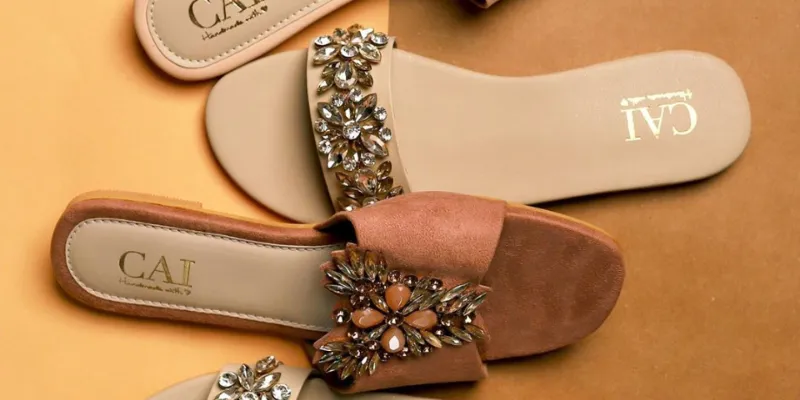This homegrown online footwear maker is giving Myntra, Koovs, and Ajio a run for their money
The CAI Store was founded in 2015. It manufactures and sells flats, closed flats, heels and wedges. The brand, which claims to serve around 2,000 customers every month, recorded a turnover of Rs 3.85 crore last year.
In a world plagued by the coronavirus, running a business, which does not fall under the ‘essentials’ category, is not an easy feat. Retailers all over the world have seen massive drops in sales, and supply chains have broken down.

Dhanraj and Aradhana Minawala, Co-founders of The CAI Store
While only a handful of retailers are expected to come out of the crisis relatively unscathed, those who were able to modify their operations and course-correct as the terrain changed, still lived to fight another day.
One such company in India that was able to quickly adapt to the unfolding coronavirus crisis is , a footwear company founded in 2015.
During the height of the crisis, the company says it has been able to lean on its online presence to come to its rescue.
“Even though the business has taken a hit, and cash on delivery (COD) has also been shut down, we are getting orders on a prepaid basis,” said Dhanraj Minawala, Co-Founder of the company. The brand had to shelve its plans to launch its retail store in June due to the pandemic.
Uncertainty and slightly changed consumer habits after the crisis ends has unnerved retailers all over the world, and Dhanraj says he expects to see the sector take a big hit in India.
British footwear brand Clarks reported a 20 percent drop in its sales in India in April, a klaxon for similar companies, while reports of India losing export orders worth $1 billion further stoked slowdown fears.
The one saving grace for retailers can be the reduction in goods and services tax (GST), as lower prices could create more demand, Dhanraj opines.

The 32-year-old founded the company with his wife, Aradhana Minawala (33), in Mumbai, after pooling Rs 4 lakh from their savings, and borrowing around Rs 8 lakh from friends and family.
The company – which claims to be 100 percent vegan – offers 190 varieties of flats, closed flats, heels and wedges. It clocked in a turnover of Rs 3.85 crore last year, and said its focus, going forward, will be on creating comfortable and casual footwear.
The CAI store competes with relatively cheap brands like Myntra, , and Ajio, among others, and its shoes are priced between Rs 999 and Rs 3,000, mostly.
The company serves around 2,000 customers through its online and offline channels, monthly.
The beginning
After completing his education in gemology from London, Dhanraj joined his family’s jewellery business. He met Aradhana – a graduate from Warwick University – and the two soon got married.
A product of the digital age, the duo tried to modernise the traditional jewellery business by starting a digital marketing vertical. But soon, they realised they could not manifest their highest potentials as entrepreneurs in the antiquated jewellery business, and that is when the two decided to explore other avenues.
Their eureka moment was when they discovered their mutual love for shoes.
“Aradhana was seven months pregnant when we did our first exhibition – a little flea in 2018, to test the water of this industry. We made 500 new pairs and booked a stall. Our shoes sold out instantly, to our surprise,” says Dhanraj. That gave the two the confidence and validation to pursue the business.
Like any new venture that breaks into a relatively cloistered industry, one of the earliest challenges the company faced was setting up the business and streamlining operations.

What worked for the brand?
The first thing the company focussed on was raw materials, which the duo decided to source locally. Dhanraj says he wanted the shoes to be handmade, with traditional weaving and embroidery. This helped the brand expand its product line, and offer shoes of different varieties and quality.
All shoes are manufactured in a facility in Byculla, Mumbai.
The next was brand traction, which involved creating a buzz about the company and introducing an unknown company to potential customers.
Social media was one of the tools the brand used to connect with its client base. The platforms – Facebook, Twitter, and Instagram – helped drive sales for the company, as well as create a faithful fan following.
“We have partnered with 130 social media bloggers and influencers with whom we run our campaigns consistently,” says Aradhana. The CAI store has nearly 104,000 followers on Instagram.
Another strategy that worked for The CAI Store is offline marketing through exhibitions and events.
“We are primarily an online brand, and our customers don’t get to touch and feel our products before buying them. Exhibitions and pop-ups are platforms where we can meet our customers, and take their feedback,” says Dhanraj.
The company does not have a retail presence since it sells via resellers. It recently set up an office-cum-shoe studio in Mumbai.
The company exports shoes to South America and Nepal, and will soon start delivering in Sri Lanka.
Recently, the shoemaker introduced size 35 in its collection, which is rare among the bigger brands.
Edited by Aparajita Saxena









